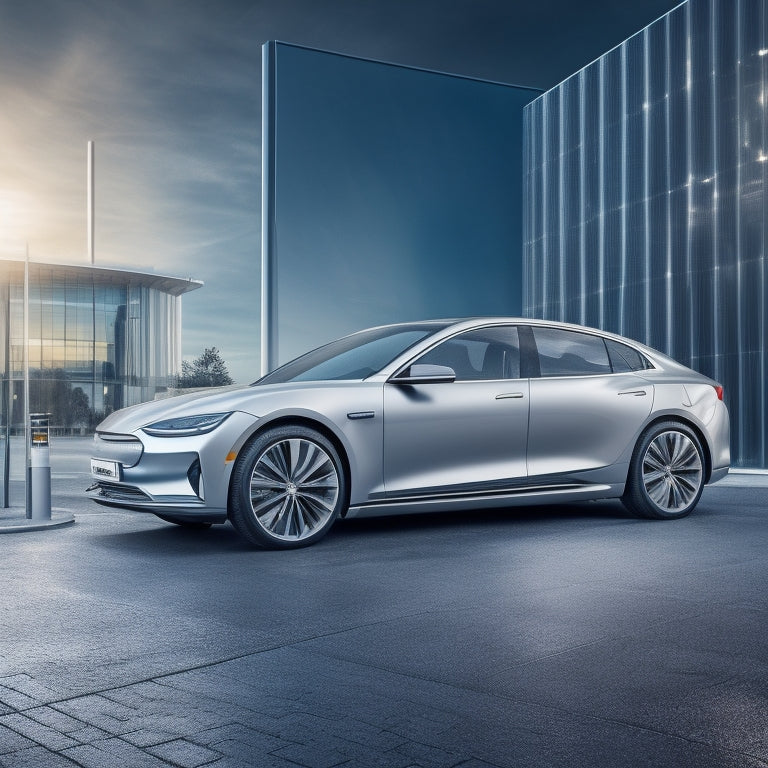
Electric Vehicles: Latest Purchase Guide
Share
Understanding the electric vehicle (EV) market requires comprehending the retail landscape, charging options, and battery essentials. Buyers can purchase EVs from major automotive manufacturers, electric car dealerships, or online. Proximity to service centers and test drives are important considerations. Charging options include public stations, domestic networks, and industrial sockets, each with varying charging times and socket types. To guarantee peak performance, it is vital to grasp the charging infrastructure. By taking these factors into account, buyers can make an informed decision, and delving further will reveal the full range of possibilities available in the world of electric vehicles.
Key Takeaways
• Consider purchasing from major automotive manufacturers that offer electric and hybrid models with online buying options.
• Proximity to service centers is crucial when choosing a dealership for convenient maintenance and repairs.
• Test drives are essential to assess fuel savings, autonomy, and overall driving experience before making a purchase.
• Plan ahead as dealerships may need to order electric models, and consider charging speed, convenience, and accessibility when choosing a charging method.
• Understand the charging infrastructure, including Level 1, Level 2, and DC Fast Charging, to ensure peak performance and convenience.
Where to Buy Electric Cars
Major automotive manufacturers, including industry giants, are increasingly making electric vehicles (EVs) more accessible, with at least one electric or hybrid model available for purchase from their dealerships.
Electric car dealerships now offer online options, making it easier for customers to explore and purchase EVs from the comfort of their own homes. When selecting a dealership, consider proximity to a service center for maintenance and convenience.
Test drives are essential to observe fuel savings and autonomy, ensuring the EV meets your needs. Some dealerships may need to order electric models, so plan ahead.
Electric Vehicle Charging Options
Numerous electric vehicle charging options are available, catering to various user needs and preferences, including public stations, domestic networks, and industrial sockets.
Public charging stations provide convenient charging on-the-go, while domestic network charging offers the comfort of recharging at home.
Industrial sockets, on the other hand, provide faster and more efficient charging.
Understanding the different charging options is essential for a seamless electric vehicle ownership experience.
When choosing a charging method, consider factors such as charging speed, convenience, and accessibility.
Battery and Charging Essentials
The battery and charging system are critical components of an electric vehicle, necessitating careful consideration to guarantee peak performance and range. To make sure top battery maintenance, it is essential to understand the charging infrastructure and its implications on the vehicle's performance.
| Charging Type | Charging Time | Socket Type |
|---|---|---|
| Level 1 (120V) | 24 hours | Domestic socket |
| Level 2 (240V) | 4-6 hours | Industrial socket |
| DC Fast Charging | 30 minutes | Public charging station |
Frequently Asked Questions
Are Electric Vehicles More Expensive Than Traditional Gas-Powered Cars?
Electric vehicles are currently pricier than traditional gas-powered cars, but approaching price parity; however, cost comparison reveals that EVs' lower operating costs and potential incentives can offset the higher upfront expense.
How Do I Dispose of an Electric Vehicle's Battery at the End of Its Life?
At the end of its life, electric vehicle batteries can be disposed of through responsible recycling methods, minimizing environmental impact, and many manufacturers offer take-back programs or partnerships with recycling facilities to guarantee sustainable disposal.
Can I Install a Charging Station in My Condominium's Parking Garage?
'Installing a charging station in your condo's parking garage? Be ready for a labyrinth of logistics! Confirm compliance with condo rules, navigate parking restrictions, and factor in installation costs, homeowner approval, garage renovations, and electrical upgrades.'
Do Electric Vehicles Have Enough Power for Towing a Trailer or Boat?
Electric vehicles' towing capacity varies by model, with some offering sufficient power output for hauling small to medium-sized trailers or boats, but engine performance and trailer weight must be carefully considered to guarantee safe electric hauling.
Will Electric Vehicles Eventually Replace Traditional Gas-Powered Cars Completely?
As the ignition of innovation sparks a cleaner future, electric vehicles are poised to surpass traditional gas-powered cars, driven by the imperative for Energy Security and mitigating Environmental Impact, ultimately paving the way for a sustainable transportation revolution.
Related Posts
-

Why Solar HVAC Filters Revolutionize Home Energy Efficiency
By adopting solar HVAC filters, you're shifting your home's energy reliance from fossil fuels to clean, renewable sou...
-

3 Sun-Powered Automated Shades for Energy-Savvy Homes
You're looking to change your home into an energy-savvy haven, and sun-powered automated shades are an essential step...
-

10 Eco-Friendly Air Management Tools for Clean Home Living
You're taking an essential step towards creating a healthier living space by seeking eco-friendly air management tool...


